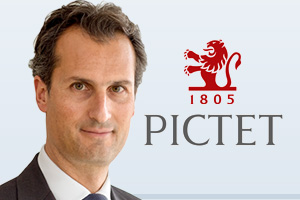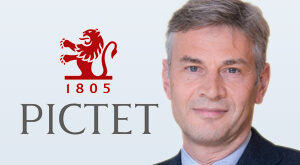
![]() SJB | Korschenbroich, 09.06.2022.
SJB | Korschenbroich, 09.06.2022.
Im Berichtsmonat April lag die Wertentwicklung von Umwelttechnologie-Aktien in etwa auf einer Höhe mit der des MSCI World Index, der 2,97 Prozent einbüßte. Energieeffizienz erwies sich als schwächstes Segment, aber auch die Sektoren Halbleiter und Industrie schmälerten das Ergebnis. Ansteigende Rohstoffpreise, Logistikprobleme sowie die Sorge vor einem globalen Wirtschaftsabschwung dämpften die Stimmung der Investoren. In diesem angespannten Marktumfeld generierte der Pictet – Global Environmental Opportunities P EUR (WKN A1C3LN, ISIN LU0503631805) eine Wertentwicklung von -2,54 Prozent auf Monatsbasis und liegt über ein Jahr weiter mit +3,72 Prozent im Plus. Der aktuelle Monatsbericht von Pictet-FondsManager Luciano Diana analysiert für alle Investoren der FondsStrategie SJB Nachhaltig die Veränderungen im Portfolio und liefert einen Ausblick für die Aktienmärkte des Environmental-Sektors.
Market Outlook
Stocks suffered a sharp sell-off in April. The Nasdaq fell 13%, its worst monthly decline since the 2008 global financial crisis, following disappointing quarterly results from some of world’s largest tech firms, including Apple, Amazon and Netflix. The index is down more than 20% since the beginning of the year while the S&P 500 Index has witnessed its worst start to the year in more than 80 years. More broadly, the MSCI World Growth Index ended the month 22% below its peak, which it hit in November last year, its steepest peak-to-trough fall since 2008. The decline in stock markets came as Fed officials continued to press the case for further interest rate hikes to battle inflation, which hit a 40-year high in April. Bond markets sold off in response to the increasingly hawkish rhetoric, with yields on the US 10-year inflation-linked bond moving into positive territory for the first time since 2020 and the 10-year nominal bond yield threatening to break through the key 3% mark.
Performance Analysis
The strategy performed in line with the MSCI AC World Index during the month of April. Energy Efficiency was the weakest segment, with underperformance across semiconductor stocks, such as Applied Materials and Infineon, as well as industrial efficiency stocks, such as Schneider Electric and Keyence. Despite robust backlogs, the supply chain shortages, increasing raw material and logistics cost, and concerns about a potential economic slowdown weighed on investor sentiment. Pollution Control and Dematerialized Economy also detracted from performance as environmental monitoring stocks, such as Danaher and Agilent, pollution control stocks, such as Tetra Tech, and Dematerialized Economy stocks, such as Synopsys and Ansys, suffered from multiple compression due to rising interest rates. Within Renewable Energy, SolarEdge detracted due to investors’ concerns on the negative impact from the AntiDumping and Countervailing Duty inquiry of the US Department of Commerce. Orsted also underperformed due to continuous headwinds on wind supply chain. Within Sustainable Agriculture & Forestry, West Fraser contributed positively due to a rebound in lumber prices.
Portfolio Activity – Overweightings & Underweightings
During the month, we increased our exposure to Pollution Control and Waste Management & Recycling, and we reduced our exposure to Dematerialized Economy, Energy Efficiency and Renewable Energy. Within Pollution Control, we initiated a position in Eurofins Scientific due to its improving business outlook and corporate governance, supported by fair valuation. We also added to Aecom in this segment. Within Waste Management & Recycling, we continued to build our positions in Waste Management and Stora Enso, added to International Paper, and we took profits in Republic Services. In Dematerialized Economy, we continued to take profits in Synopsys, Cadence, Autodesk, Ansys and Dassault Systemes on valuation grounds to account for a higher interest rate environment. In Energy Efficiency, we initiated a position in Shimano due to the resilient demand for its products and its solid cash flow generation. We also reduced Nidec, Applied Materials, Schneider Electric and Keyence, factoring in more moderate near-term growth assumptions. In Renewable Energy, we reduced Vestas given the continuous headwinds on the supply chain of wind turbine manufacturers and higher pressure on its operating margins.
Market Outlook
The outlook for the environmental theme remains promising. While our portfolio holdings will not be completely insulated from inflationary pressures, they have sufficient pricing power to navigate well in an inflationary environment. The current dislocations in the energy markets put the spotlight on the pace and affordability of the energy transition, stimulating renewable energy investments as well as corporate investments in energy saving technologies. We expect a healthy demand for industrial efficiency solutions, provided that spiralling energy prices do not lead into a recessionary environment. We see a robust semiconductor demand cycle, driven by automotive electrification and industrial automation solutions. We see a steady demand for building automation technologies. We expect the electrification and the digitization of the economy to continue to gain momentum, supporting demand for digital product life cycle management (PLM), design and engineering software and industrial IoT. Within renewables, we prefer exposure to solar over wind as solar energy is less impacted by short-term logistics challenges, component shortages and raw material price increases. We see very robust end-market demand for environmental remediation and climate resilience in the US, bolstered by public infrastructure investments.
Portfolio Strategy
Our strategy remains focused on investing in environmental solutions providers. We believe that exposure to environmental trends offers investors attractive risk-adjusted returns, regardless of the stage of the economic cycle. We favour solutions providers with wide economic moats, robust profitability, healthy balance sheets and business models that don’t rely on government subsidies. These companies are not only likely to weather a difficult economy, but also to perform well during the recovery phase. Our bottom-up investment process results in a concentrated global portfolio with a growth and quality bias. Long term, the trends of population growth and rising living standards are inescapable and so is the growing strain on natural resources. Awareness of environmental issues has grown tremendously in the last few years and is now deep-seated, top of mind for an entire generation of citizens, consumers and investors.
Pictet – Global Environmental Opportunities Management Team
Luciano Diana
Gabriel Micheli
Yi Du



